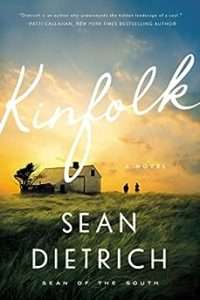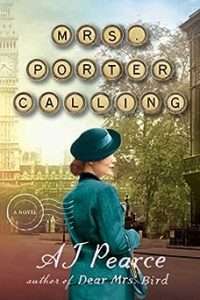REVIEW: Funny Story by Emily Henry
 Dear Emily Henry,
Dear Emily Henry,
After reading and loving your books for a number of years now, I’ve come to have high expectations. I’ve yet to be disappointed.
There must be a signal released in my brain when I recognise your words; something in me just relaxes and prepares to be all-in on the story. I guess all my favourite authors have it – that thing where recognition occurs from that first page. It’s comforting and exciting all at once.
Funny Story is about Daphne Vincent, a children’s librarian who moved to Waning Bay on Lake Michigan with her fiance, Peter. Daphne has always wanted to belong somewhere and to someone. She is very close with her mother, but after her dad left when she was little, they moved around a lot and Daphne learned not to make friends because they wouldn’t be staying long enough for her to keep them. Her dad has been unreliable all her life and many of her childhood memories around him involve her waiting for him to arrive and fairly often him not turning up at all. She wants roots and friends and family beyond her mother and thinks she has it in Peter. She’s made an incredible effort to be accepted by his friends and family.
But then, following his bachelor party, Peter announces that he’s actually in love with his best friend, Petra, and Daphne is left very much alone.
I’d thought we were building something permanent together. Now I realize I’d just been slotting myself into his life, leaving me without my own.
Petra had been living with her boyfriend, Miles Nowak. When Petra moves in with Peter, Daphne needs a place to live. Miles, in turn, could use help with the rent. Plus, he’s a nice guy. So Daphne moves into the second bedroom in Miles’s apartment. Daphne is hurt and reeling and counting down the days until she can leave Waning Bay and go somewhere else, to start again. Miles is not any happier and they bond over their shared heartbreak.
Very shortly after they are dumped, Daphne and Miles are shocked to receive wedding invitations in the mail for Peter and Petra. After the initial pain of it wears of, Daphne allows some anger in. And, when Peter is being condescending in a phone conversation, she blurts out that she and Miles are dating.
“I didn’t need a plus-one. He got his own invitation.”
The weighty silence tells me Peter is doing invisible calculus now. Only he’s got the brain for it. “You can’t mean . . .” His voice slides past disbelief straight into incredulity. “You’re with Miles?”
No, no, no, the voice in my head screams.
“Yep!” my mouth chirps.
I am instantly back to silent Munch-screaming out the window.
The next silence extends too long. I’m incapable of breaking it, because the only thing I can think to say is, I don’t know why I said that—it’s an outright lie, but I also cannot. Cannot tell him that.
Miles is pretty easygoing and is prepared to go along with the fake relationship. He’s also come to value Daphne as a friend and when he finds out she’s planning to leave town at the end of the summer, he embarks upon a plan to show her the real Waning Bay and the surrounds and convince her to stay. Most Sundays they play tourist and Daphne learns more about the town than she ever did while with Peter. She realises that Peter had never made an effort to help Daphne belong or be welcome.
“Daphne,” he tuts. “Daphne, Daphne, Daphne.”
“Let me guess: I’m a clueless fool,” I say.
He starts the car. “No, just a sweet, naive, beautiful little innocent, raised in captivity by a man who loves wheatgrass.”
As Daphne and Miles spend more time together, a simmering attraction develops and grows, bursting out of them from time to time before they try and put the genie back in the bottle rather than risk their friendship and their copacetic living arrangement. But it just won’t go away.
The thing, it would seem, Miles has been hiding all along is that he’s diabolically handsome, with angular cheekbones and a jaw that sort of looks like it might cut your fingertips if you were to run a hand over it. Or your tongue. You know, whatever.
Miles is nice. He’s popular with locals and strangers alike. He’s able to strike up a conversation easily and is genuinely interested in what people say to him. He’s easygoing and laid back – basically the opposite of Peter. (He also has a quirky but endearing love of sad love songs.)
Daphne has a deep sense of not being good enough, not being worth staying for, not being anyone’s first choice (apart from her mother). She wonders what is wrong with her that people leave.
Miles has his own baggage. Raised in an extremely toxic household, he feels great responsibility for his (13 years’ younger) sister, Julia. He feels like he didn’t do enough and let her down. He feels like he always lets people down when it counts.
To him, he’s the brother who ran away. To her, he’s the one who stays, even when he shouldn’t.
He tries hard to live in the moment and not to foster too much expectation from others. At least, that’s what he says. It’s clear enough that that the connections he’s made in Waning Bay don’t share that view at all. Yes, he’s often late because he gets caught up in conversations and because he’s very good at being in the moment but people want him around – he’s kind, generous, funny and personable. Because of that genuine interest, he knows everyone in town.
Miles’s philosophy can be summed up in this passage:
“Things go smoother if you don’t let people get a rise out of you,” he says. “If you give them control over how you feel, they’ll always use it.”
“Finally, I see your cynical side,” I say.
He smiles, but his jaw is tight, and it doesn’t reach his eyes. “It’s not cynical. If you don’t give other people responsibility for your feelings, you can have a decent relationship with most of them.”
Honestly, it’s not far off from thoughts I’ve had. Only for me, it’s never been about controlling the feelings themselves. I wouldn’t know where to begin with that. It’s more, controlling the expectations you have for certain people.
If a person lets you down, it’s time to reconsider what you’re asking of them.
Whereas Daphne’s is very different.
You can’t force a person to show up, but you can learn a lesson when they don’t.
Trust people’s actions, not their words.
Don’t love anyone who isn’t ready to love you back.
Let go of the people who don’t hold on to you.
Don’t wait on anyone who’s in no rush to get to you.
Beyond the relationship between Miles and Daphne though, Funny Story, charts Daphne coming into her own, learning more about herself, putting herself out there and finding her own sense of belonging rather than looking for it from others. She makes a good friend at work, Ashleigh, and their growing bond is also great to witness. I liked Ashleigh very much – as well as the other library staff and other locals we meet along the way.
I also liked that Daphne learns she isn’t perfect and that, ultimately, it’s okay – people make mistakes and hurt others, even she does. She has to grapple with not just being the one being left waiting, but being a person who has let others down. It’s a thing she’s never realised before – mostly it’s never come up (my impression was this was largely because she lived her life in such rigid compartments before the Peter/Petra catastrophe – which turned out to be the best thing for her). But things get a little messy and Daphne realises that not everything needs to be coloured inside the lines. She also realises she’s worth loving, worth staying for and worth investing in – by others and by herself.
I liked very much that Miles got support he didn’t even know he needed from Daphne and was able to see himself through her eyes and realise that he’s worthy too.
Funny Story is told entirely from Daphne’s point of view which makes sense given the eventual conflict between she and Miles. You set up very well the reasons for each character to act as they do. I did think that Miles’s initial explanation as contrasted with the more complete version was a little bait-and-switchy. It made the ending more satisfying but it felt to me a bit like the conflict was a tad manufactured. That’s really my only criticism of the book – otherwise, I pretty much loved it from start to finish. And, I want to reiterate, the HEA was extremely satisfying.
Grade: A-
Regards,
Kaetrin

 Hairstylist Jess Greene has spent the last decade raising her younger half-sister, Tegan—and keeping a shocking secret. Ever since their reckless mother ran off with a boyfriend she’d known only a few months, Jess has been aware that he’s the same accomplished con man who was the subject of a wildly popular podcast,
Hairstylist Jess Greene has spent the last decade raising her younger half-sister, Tegan—and keeping a shocking secret. Ever since their reckless mother ran off with a boyfriend she’d known only a few months, Jess has been aware that he’s the same accomplished con man who was the subject of a wildly popular podcast, 
 Note: Charlotte Stein have followed each other and have been friendly online for many years. This review is my unvarnished opinion regardless.
Note: Charlotte Stein have followed each other and have been friendly online for many years. This review is my unvarnished opinion regardless.








 Dear Elle Kennedy,
Dear Elle Kennedy,